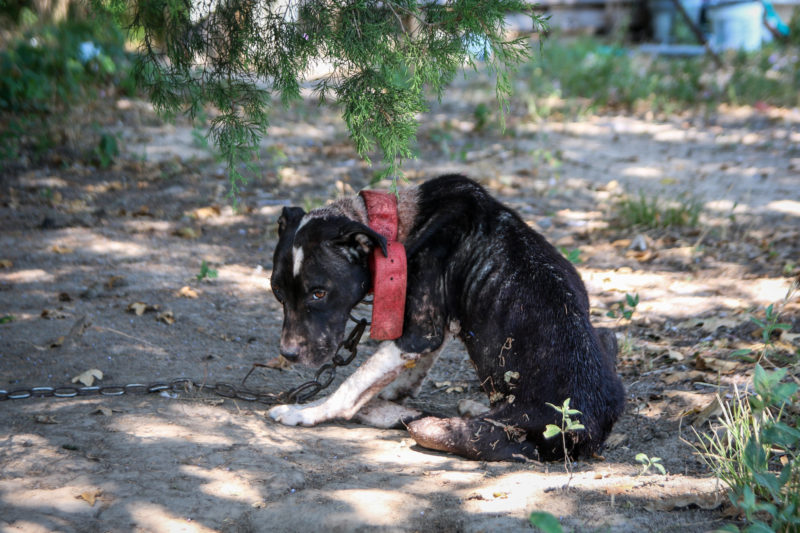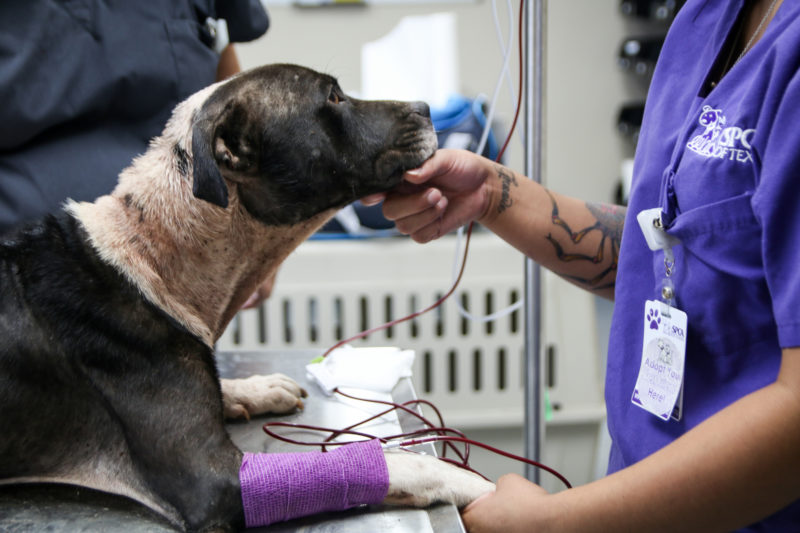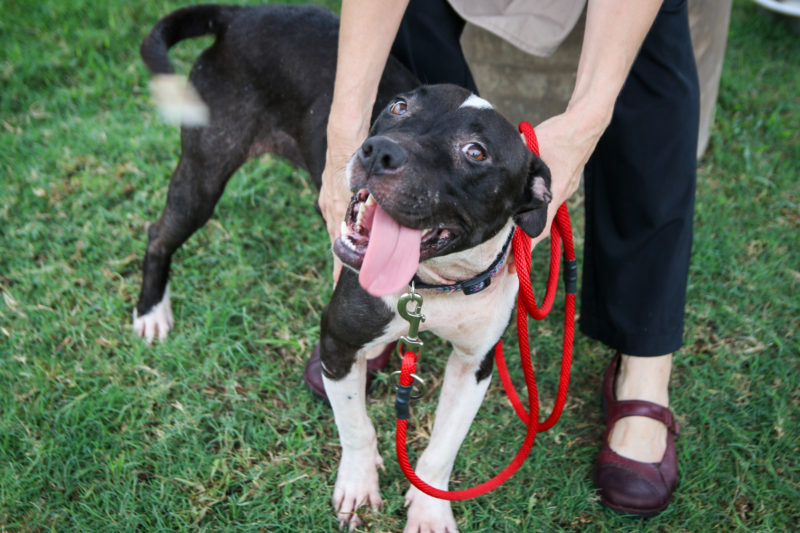14 Years and a Reversed Veto Later, Dog Advocates Get Their Animal Cruelty Law
By Cristela Jones
Reporting Texas

Gwen, a dog rescued by the Kaufman County Sheriff’s Office sits outside tethered to a tow chain drilled into the ground in Able Springs, Texas, on July 29, 2016. The SPCA of Texas Rescue and Investigations team seized 14 dogs after receiving an anonymous complaint regarding cruelly treated animals in Kaufman County. Photo courtesy of The Society for the Prevention of Cruelty to Animals of Texas.
When Austin Animal Control officers found Sunney, a 6-year-old pitbull mix, she was dehydrated, underweight and riddled with heartworms. A skin infection marked her neck where she had escaped from a chain to find food and water for her newly delivered puppies.
Stacy Sutton Kerby saw something in Sunney and adopted her from the Austin Humane Society in 2017.
“There are a lot of Sunneys out there and she’s happy now. (She) kept me going,” Kerby said. “It can take time. It can take training, but formerly chained dogs under the right circumstances, they can have a new life.”
As director of government relations for the Texas Humane Legislative Network, Kerby has worked for years to strengthen Texas’ animal cruelty laws, culminating in passage this fall of Senate Bill 5.
The law seeks to build on the Texas animal cruelty laws passed in 2007 and 2015. It requires drinking water for outdoor animals, prohibits the use of chain restraints and eliminates a 24-hour waiting period that kept animal control officers from addressing tethered animal situations immediately. SB5 also states that animals must be housed in adequate shelter outside to keep them safe from inclement weather. Violators will face a Class C misdemeanor if they do not abide by the new law, and punishment increases for repeat offenders to a Class B misdemeanor.
The measure was signed in October by Gov. Gregg Abbott — who earlier this year had vetoed similar legislation — and will go into effect Jan. 18, 2022.
The legislative victory culminated 14 years of work by lawmakers and animal advocates who thought Texas’ animal cruelty statutes were too weak.
In 2007, then-Gov. Rick Perry signed a law which required that dog collars be constructed of “nylon, leather or similar material, specifically designed to be used for a dog,” but it did not ban the use of chains. The law applied only to unincorporated parts of counties not covered by city ordinances, and it did not require that dogs be provided drinkable water, access to shade or protective shelter. It also required law enforcement to give dog owners a 24-hour warning before taking any action, a loophole that hindered enforcement, according to the Texas Humane Legislation Network.
The organization worked with the Texas Animal Control Association and others in 2015 to fix what they viewed as defects in the 2007 law.

Gwen is transferred to the SPCA Emergency Rescue Center where she is treated by SPCA veterinary staff on July 29, 2016. Gwen and the other animals rescued from the seize in Able Springs had varying health issues including hair loss, flea infestation and sores. Photo courtesy of the SPCA of Texas.
“There was nothing animal control officers could do whenever people were tying their animals up,” said Jamey Cantrell, Texas Animal Control Association president. “And so, what was important for us was getting a good tool that would help animals all across the state.”
Sen. Eddie Lucio Jr., D-Brownsville, proposed the Safe Outdoor Dogs Act in 2015 after hearing from constituents and U.S. postal workers about the poor living conditions of some dogs.
“They realize that our dogs aren’t just pets; they’re family,” Lucio said. “A chained dog with no shade, no water that can barely move is living in a kind of personal hell, and this bill is about creating a minimum standard for dogs that are outside.”
Lucio, who has seven dogs of his own, most of whom were rescued, called the 2021 animal cruelty bill “more than just an animal rights bill. It is a public health bill.”
But Lucio’s bills in the legislative sessions of 2015, 2017 and 2019 were felled by parliamentary maneuvers after running into opposition from a group of conservative lawmakers and from the Responsible Pet Owners Alliance of Texas. In 2019, the alliance opposed Lucio’s proposed legislation through emails and phone calls urging the public not to support it.
The RPOA and others argued the bills would infringe upon individual liberties and could result in jail time, which they viewed as unwarranted.
In 2019, state Rep. Jonathan Stickland, R-Bedford, utilized a point of order to kill Lucio’s bill without a vote in the final days of the legislative session. The alliance and Stickland did not respond to a request for comment, but in a tweet from 2019, Stickland said, “I didn’t kill #SB295. Those who refused to work on the problems with the bill led to its demise.”
“It’s always looked like it’s going to pass and there was always hope that it was going to pass, but then it just died towards the end and that was real sad,” said Nathan Gauldin, policy analyst for Lucio. “Stickland was the major opponent that killed it every session as he kills a lot of legislation.”
Stickland did not seek re-election in 2020, giving animal advocates new hope when the Legislature met in 2021.
Meanwhile, reports of dogs and other animals dying from being abandoned outside rose in Texas, especially during the February snow storm.
In Houston, a man was arrested after leaving eight dogs outside in freezing temperatures. Other violators who may not have faced criminal charges were exposed on social media by their neighbors for neglecting their animals in unsheltered, freezing temperatures.
The Texas Humane Legislative Network worked to introduce a new version of its legislation, SB 474, this spring. With more than 100 co-sponsors and wide bipartisan support, it cleared both chambers of the Legislature — only to be voted by Abbott in June. The governor’s office did not respond for comment on this story, but in a statement with the veto, Abbott said, “Texas is no place for this kind of micro-managing and over-criminalization.”
Abbott’s veto drew public backlash when many Texans took to social media to post opinions with the hashtag #AbbottHatesDogs.
Kerby and other animal advocates were shocked by the governor’s decision since the bill did not prevent dog owners from restraining their dogs outside, nor did it change the criminal penalties already in place for violators.
“We pivoted back to the governor’s office, and we said, ‘Let’s address the items in the veto proclamation and let’s figure out where there’s been a misunderstanding,’ ” Kerby recalled.

Gwen plays outside at SPCA’s Emergency Rescue Center after being assessed by veterinary staff on July 29, 2016. Photo courtesy of the SPCA of Texas.
The Texas Humane Legislation Network and Lucio introduced a new version of the bill, SB5, in a special legislative session following Abbott’s veto. It maintained exceptions for dog owners who restrain herding and farming dogs, dogs on leashes attached to a trolley system, hunting dogs and dogs that are left inside an open-air truck bed for a “reasonably necessary” amount of time.
Law enforcement groups, veterinarians, rescue groups and animal welfare experts supported the measure. Cantrell credited the bill’s final passage to the loyal support it received from Texas dog lovers who fought alongside advocates and lawmakers hungry for change.
“It really is the people who voiced their opinion, who said that animals deserve better in our state,” Cantrell said. “They’re the reasons why we are where we are right now.”
After Senate Bill 5 is enacted in January, Lucio will keep advocating for animals, he said. (In November, Lucio announced he will not seek re-election.)
“We need to see if the law is working. We need to look at past violators and see if they have new dogs and if they’re doing the same thing all over again,” Lucio said. “I’m not trying to be a micromanager of anybody’s pets, but I would like to see if there’s been a change of mentality in our community because people are now aware more than ever how important it is for them to follow the law and to make sure that their pets are safe.”